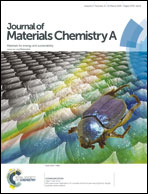Effects of boron oxidation state on electrocatalytic activity of carbons synthesized from CO2†
Abstract
This work addresses the substantial effect of oxygen co-insertion into boron-doped porous carbon (BPC) on the activity of the oxygen reduction reaction (ORR). The BPC synthesis is based on simple CO2 carbonization using NaBH4 as a reducing agent with subsequent thermal treatments. Electrochemical, microscopic and spectroscopic measurements with density functional calculations reveal that the presence of oxidized boron atoms (O–B–C species) in the B–C bonding is responsible for the enhanced ORR activity, preferential 4 electron pathway, and high cycle stability.


 Please wait while we load your content...
Please wait while we load your content...